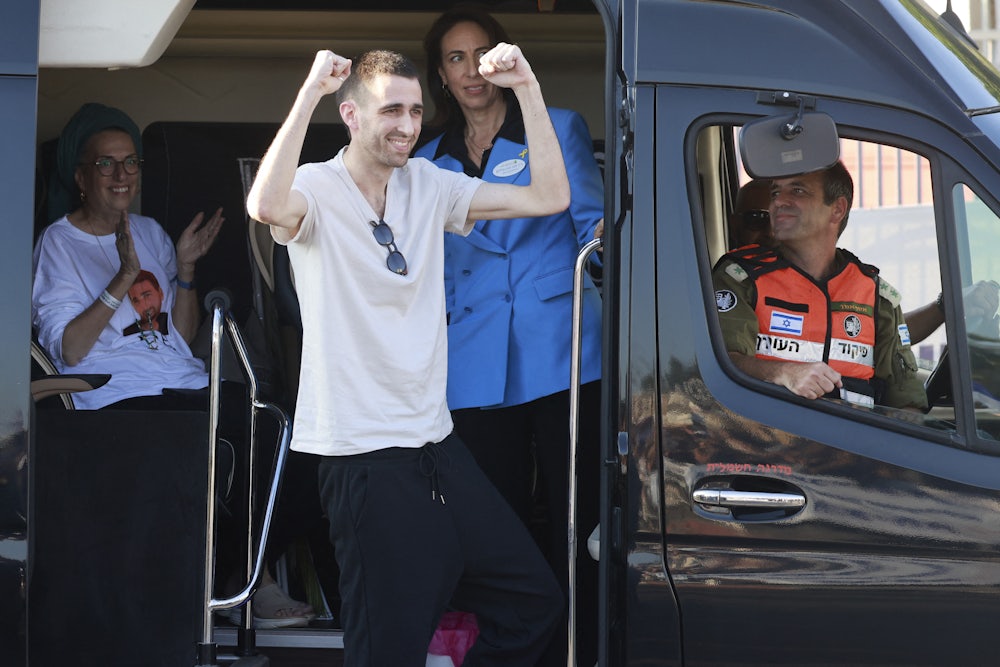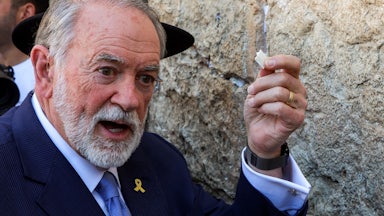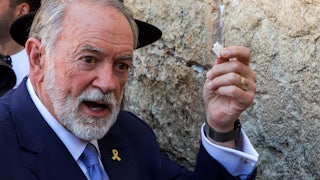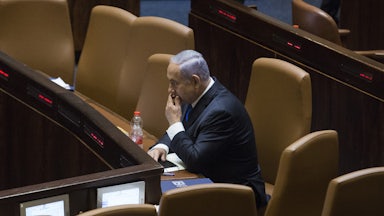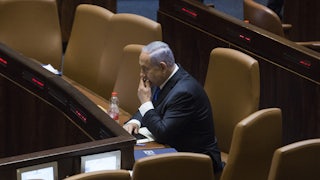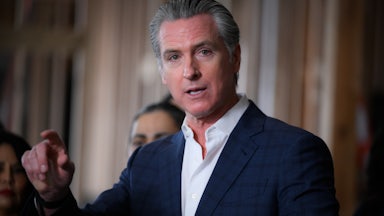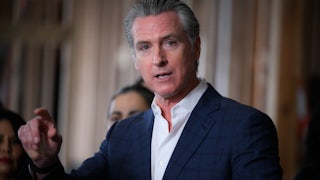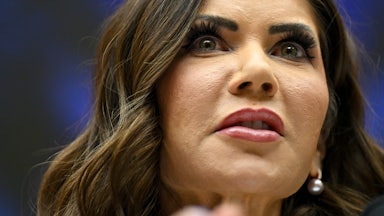I happened to be on the floor at last year’s Democratic convention when Jon Polin and Rachel Goldberg, the parents of Israeli-American hostage Hersh Goldberg-Polin, spoke about their ordeal. There were press reports that they were a little nervous about the reception they were going to receive, given the hostile sentiment toward Benjamin Netanyahu’s war in Gaza among rank-and-file Democrats. Some on the right were saying they were going to be booed, or at best greeted with indifference.
At conventions, journalists get floor passes for brief periods of time. You often can’t choose when you’ll be so close to the action, so it was just an accident that I happened to be there at that time. As for their reception, well, you could have heard a pin drop. I studied the faces of delegates. Everyone I saw was paying rapt attention. I noted Representative Steve Cohen of Tennessee, whom I know a bit, sitting at the head of his state’s delegation. I went over and said hello. He knew the Polin-Goldbergs well, had met with them many times, and told me what remarkable people they were.
Hersh, who was taken at gunpoint on October 7, 2023, at the Nova music festival, is not among the 20 hostages who finally went home today. His parents spoke in Chicago on August 21. Ten days later, the Israeli military announced that he and five others had been killed by Hamas.
How do we think about a day like today? The first reaction is one that should transcend partisan politics. Everyone should be glad that the hostages have been freed. Partisan politics was not visible on the faces of those Democratic conventiongoers that night last August. They were focused, rightly, on two grieving parents. My friend and sometime TNR contributor Jo-Ann Mort travels to Israel frequently and has told me, as one can also glean from media reports, that the hostages’ faces have been everywhere, and every Israeli knows their stories intimately. On a simple human level, this is a day to be celebrated.
I’ll add a thought on behalf of the hundreds of Palestinians freed today as well. Many of these people are rounded up in broad sweeps and either held without specific charges or tried by military-style tribunals where they aren’t accorded the usual rights enjoyed by civil defendants. That’s a lot of grieving families too.
The second reaction is to hope, however we feel about Netanyahu and Donald Trump, that this peace process succeeds. I still want to believe a two-state solution could be possible. That will require different Israeli leadership. Netanyahu has made clear for many years that he doesn’t believe in peace with the Palestinians. As Israeli analyst and former diplomat Alon Pinkas wrote at TNR last week, there’s a strong chance Netanyahu will bide his time and find an occasion to blow this peace deal up. His speech this morning in the Knesset wasn’t about peace at all; it was a victory lap. According to MSNBC’s David Noriega this morning, Netanyahu’s speech was broadcast briefly on the large video screens above Tel Aviv’s hostage square. He was booed. The screens returned to testimonials from the hostage families.
And it will obviously require different Palestinian leadership. If Hamas is as decimated as Israel says, they’re out of the way for now, and that’s great for the Palestinian people, whose true interests Hamas has never served, to put it mildly. The Palestinian Authority is corrupt and compromised and desperately needs new leadership. We should all be hoping that somehow or other these things happen, and this process stays on track.
The third reaction is tougher to think about than the first two, as it requires us to entertain the possibility that the Trump-Netanyahu worldview got it right this time. Did it? Well, the hostages are home, and a peace process is underway, and these, as noted, are great things. But only time will really tell. Even now, as Trump and Netanyahu bask in the glow of what they tout as unqualified success, we must never concede, for example, that 60,000 civilian deaths were necessary here. And those Gazans still alive are returning to find their homes gone, along with their schools and hospitals.
A U.N. report estimates that it will take 10 years just to clear Gaza’s rubble, and another 15 to make its farmland arable again. How can normal life take hold in such a place? In addition, rubble clearing is itself a deeply political act, because it requires contracts. Who’s going to get them, and how much are they going to be paid? The Times of London speculates that the Bin Laden family is likely to get a piece of the action.
I’m willing to give Trump this much. At a couple of crucial points, he did lay down the law on Netanyahu in a way most U.S. presidents don’t—in a way, let’s face it, Joe Biden probably wouldn’t have done. It’s also true that Netanyahu never would have given Biden, or any Democrat, the satisfaction of presiding over a deal like this. So the traffic on that street of mistrust runs both ways.
Still, writing in Haaretz today, editor Aluf Benn notes that Trump drew a line for Netanyahu on some crucial matters. When Netanyahu wanted to try to topple the Iranian regime last summer, Trump said no; he also made him recognize the new regime in Syria; and finally, as has been widely noted, after Israel bombed Qatar, Trump had had enough. Benn writes: “Attacking a country that bought him his presidential plane, and which hosts the largest American base in the Middle East exceeded the limits of the freedom of action Washington afforded Israel. At that moment, the countdown began to the cease-fire imposed on Netanyahu.”
Naturally, he’s still the Donald Trump who is destroying democracy and ruining lives here in America. Regardless of what happens abroad, we have an obligation to oppose his autocracy tooth and nail. That opposition, in fact, stems from the same humanitarian and democratic impulse that fuels our hopes for Middle East peace. The hope here is not naïve, but a rather cold-eyed one: Maybe the Middle East and the world will see a more benign Trump than his own country sees—that is, it may be that he’s willing to cut transactional deals with Israelis and Arabs in a way he’s obviously not with Democrats and liberals and American universities. But usually, people revert to who they are. We shall see.
